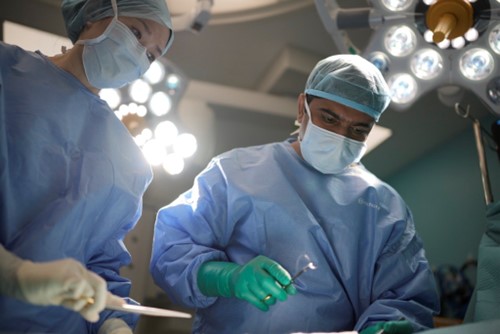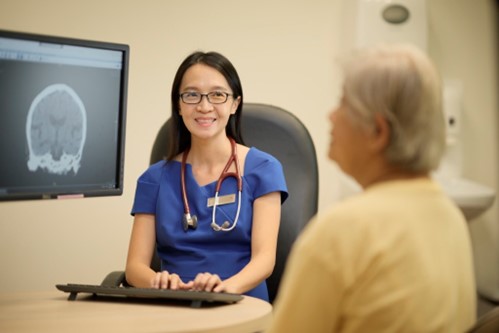NUHS Institutions will NEVER ask you to transfer money or disclose bank details over a call.
If in doubt, call the 24/7 ScamShield helpline at 1799, or visit the ScamShield website at www.scamshield.gov.sg.


Adj. A/Prof Sujith Indeewara Wijerathne
Head, Division of General Surgery
Head (Designate), Department of Surgery
Head, Division of Hernia Surgery
Senior Consultant (Surgical Services, General Surgery, Thyroid & Endocrine Surgery, Hernia Surgery)
"The work culture at Alex is different from other places, where we can communicate freely with each other without rigid boundaries. We are like one family, and a lot of support is given to one another. Even as we expand as an institution and manpower, we have not lost any of the friendships forged."
Ever since I was young, I wanted to explore a different occupation from that of my father, and Medicine was the field I was interested in. The reason why I decided to pursue General Surgery instead of General Medicine was due to the hands-on nature of the role, as well as the job satisfaction in seeing my patients get better. For instance, when patients come in for hernia repairs, we will do a minimally invasive keyhole surgery, and the patients typically get discharged on the same day and back to their routine lifestyle on the same day. Being able to help resolve their problems and seeing them return home in a better state brings me joy.
As a surgeon, most of my work revolves around clinical duties. My day will start off with early morning meetings, followed by ward rounds and then clinics, endoscopy, or operating theatre sessions. I will then finish my clinical work and attend other meetings throughout the day. At the end of the day, I will set aside time to clear my emails. Apart from clinical duties, I am also heavily involved in administrative education and research, where I will teach and educate our residents, medical undergraduate students, and clinical fellows.
From the portfolios that I hold, one of the most important ones that helped build myself to where I am is my role at the Clinical Services Planning Office (CSPO) under Medical Affairs. As part of the CSPO, I lead the Surgical Services planning and am also the Patient Safety Officer (PSO) for the Surgical Services, with the aim of developing the surgical services and enhancing the culture of receptivity to patient safety at Alex.
There are a lot of opportunities at Alexandra Hospital to develop in other portfolios, especially with the upcoming expansion to our Integrated General Hospital (IGH). When I first joined Alex 5 years back when it first started, I saw the opportunity to grow with the hospital, and I am heartened to be able to be involved with the transformation of Alex. I recently completed an Executive Master of Business Administration (EMBA) with the National University of Singapore (NUS) and the University of California, Los Angeles (UCLA), to further enhance my administrative skills so that I would be able to contribute more meaningfully to the developments and expansions at Alex."
Dr Winnie Teo, Consultant (Medicine, Haematology)
"I cherish the opportunity to work in AH as it has made me feel like I am a part of a big, happy and cohesive family with a common goal to provide the best patient care possible."
My daily duties change from day to day but more often than not, I start the day doing ward rounds, where I see and review inpatients in the hospital and decide on management for their acute care. I then head off to clinics where I see patients in the outpatient setting and discuss their symptoms and concerns before deciding on the appropriate treatment. I also spend a significant amount of time in the blood bank and haematology laboratory where I will review and assess blood tests, peripheral blood films etc., which is a critical part in diagnosing blood disorders. I carry out procedures such as bone marrow aspirations as well, which is an extremely useful diagnostic tool for us haematologists. Outside of clinical work, I attend to administrative tasks like medication and patient safety related issues. I am also actively involved in the teaching and education of residents and medical students.
I treat patients with chronic blood cancers, otherwise known as myeloproliferative neoplasms, some of which includes myelofibrosis, essential thrombocythaemia and polycythaemia vera. I also diagnose and help patients with different types of blood disorders associated with thrombosis and haemostasis, including but not limited to haemophilia, venous thromboembolism, bleeding and clotting disorders. I also see patients with other conditions including lymphoma, leukemia and multiple myeloma.
I find my job extremely rewarding as I have the opportunity to help sick patients better understand and manage their conditions. Seeing patients recover and go on to lead fulfilling lives gives me strong motivation to continue being a haematologist that can serve the needs of the population."
Dr Jesslyn Ho, Hospital Clinician (Urgent Care Centre)
"A candle loses nothing by lighting another candle." - James Keller
I love how there are so many people I meet on the job where I can pay it forward - the kindness and support I have received so far. Working with my fellow doctors allows open discussion where we share our expertise and experiences in approaching patients; interacting with patients and their families allows me to educate and empower them with knowledge of their condition; Witnessing my Allied Health colleagues work tirelessly each day really humbles me to work even harder for my patients.
The Emergency Department (ED) is a fast-paced and exciting place to work in. Although our shifts are often busy, we get a lot of interactions with patients across a diverse range of ages and demographics which help keep our work interesting. Exposure to a variety of patient ailments can help us grow the breadth and depth of knowledge which then better prepare us to provide care to those who need it. The ED also provides a stimulating work environment where we get to be on our feet, actively working and thinking all day. I love how every patient that comes through the door is just like a puzzle - each puzzle piece (i.e., history, examination, and investigations) will help lead us to the appropriate management. Outside of work, I spend most of my time with my family. Not many people might agree with me, but the nature of shift work gives me the opportunity to have more 'me-time' on weekdays and arguably allows me to have more time with my family.
The importance and value of our work in the hospital is also a key attraction to my job. Although emergency physicians do not have the continuity of care common to many other specialties, we do form very short but important patient relationships during their encounter in the ED. Every patient that comes through our doors undergoes the process of triage, where their injuries and complaints are prioritised based on their need for emergency treatment. We are often the first point of contact for critically ill patients who need immediate medical attention. We resuscitate and stabilise these patients before handing them over to our specialist inpatient colleagues. For the lower acuity patients, we assess them and provide treatment as required. If we deem that patients need further work up and management, we will admit them to the inpatient specialist teams accordingly as well. You can say we are the gatekeepers to the beds in the wards."